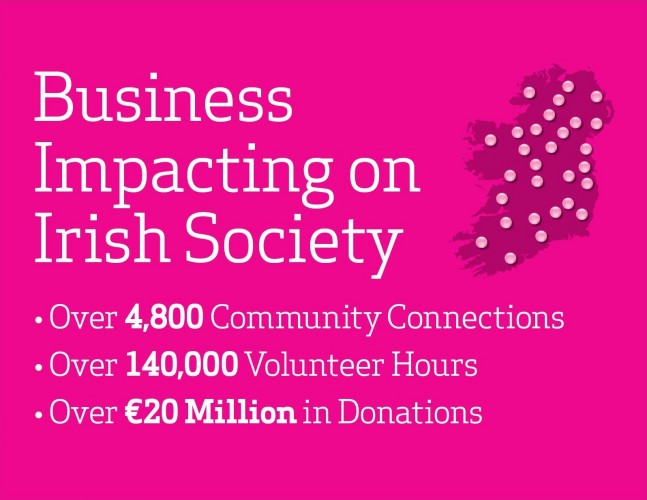Relevance of Community to CSR
 There is a well-known Irish proverb that goes Ar Scáth a chéile a mhaireann na daoine. The literal translation is that we live in each other’s shadows, but the sentiment means we all rely on each other and are inter dependent. I really like this as a philosophy for life and when Business in the Community launched the latest Business Impact Map, it seemed particularly apt. The map is an online tool which showcases the community activities of 46 of our member companies. Between them these companies contributed over €21million in cash, goods and services and over 140,000 volunteer hours to charities and community groups right across Ireland. When you look at the breath and scale of community engagement represented on the Map the extent to which business is woven into the fabric of community life right across Ireland is quickly apparent.
There is a well-known Irish proverb that goes Ar Scáth a chéile a mhaireann na daoine. The literal translation is that we live in each other’s shadows, but the sentiment means we all rely on each other and are inter dependent. I really like this as a philosophy for life and when Business in the Community launched the latest Business Impact Map, it seemed particularly apt. The map is an online tool which showcases the community activities of 46 of our member companies. Between them these companies contributed over €21million in cash, goods and services and over 140,000 volunteer hours to charities and community groups right across Ireland. When you look at the breath and scale of community engagement represented on the Map the extent to which business is woven into the fabric of community life right across Ireland is quickly apparent.
There was a time when CSR was synonymous with charitable giving and community involvement. Back in 2000 when BITCI was set up, the primary objective of the founding 9 companies was to explore how Business could improve their social impacts and engage effectively in their communities. Thirteen years on and the landscape for CSR has changed. There is a growing understanding that CSR is about a company’s total efforts to act responsibly. So as companies embed responsible practices and for example, place greater emphasis on their environmental impacts and the sustainability of their supply chain, how does community involvement relate back to business objectives?
This issue was addressed recently by the Economist Intelligence Unit as they kicked off a series of Corporate Community debates by exploring the question should charity/community involvement be part of a company’s Corporate Social Responsibility. The motion chosen was: “CSR has nothing to do with charity”. The idea was to provoke discussion on whether or not companies should treat philanthropic contributions as an important part of their social responsibilities—or whether businesses can have a greater social impact by leaving charity to others and doing what they do best: making money.
If you think about this motion and consider what CSR should be about, then, taking social impact as a starting point, arguably, the most positive impact a company can have on a community is the creation of jobs for the local population. That the people who fill those jobs are treated fairly and paid an appropriate wage for the creation and delivery of safe products and services that pay sufficient heed to the long term sustainability of resources, is the mark of a good business. This is fundamental corporate social responsibility. If you were to take the Economist’s motion that CSR has nothing to do with charity at face value you could stop here.
However as many contributors to the debate espoused, truly responsible businesses recognise that they do not ,and cannot stand apart from the communities within which they operate, and just as Ar Scáth na Chéile holds true for individuals it also holds true for organisations that make up our social ecosystems.
Incidentally whilst the motion that CSR has nothing to do with charity was carried, many contributors emphasised that addressing social impacts can bring business benefits for example building loyalty and increasing employee engagement or contributing to prosperity which ultimately builds a robust customer base and a skilled workforce. Essentially the consensus view could be summarised as community involvement cannot be the start, middle and end however it is an important tool in the overall approach.
Linda O’Sullivan
Senior CR Consultant losullivan@bitc.ie
If you would like to read more about the Evolution of Community Involvement please click here.
Click here to visit the news section of our website and learn more about CSR in Ireland.


